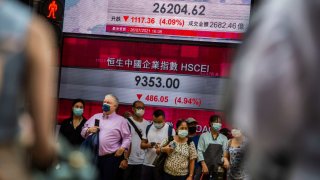
People standing in front of an electronic display showing the Hang Seng Index in the Central district of Hong Kong on July 26, 2021, after stocks plunged as tuition firms were hammered by China’s decision to reform the private education sector by preventing them from making profits.
This is CNBC's live blog covering Asia-Pacific markets.
Asia-Pacific markets fell on Wednesday as U.S. President Donald Trump's country-specific tariffs comes into effect.
Australia's S&P/ASX 200 slid 1.8% to close at 7,375.
Japan's Nikkei 225 lost 3.93% to end the trading day at 31,714.03, while the Topix traded 3.4% lower to end at 2,349.33. South Korea's Kospi edged 1.74% lower to 2,293.7. The benchmark has lost over 20% from its July high, confirming a bear market. The small-cap Kosdaq closed 2.29% lower.
Get top local stories in Philly delivered to you every morning. Sign up for NBC Philadelphia's News Headlines newsletter.
Hong Kong's Hang Seng Index climbed 0.68% to close at 20,264.49, while the Hang Seng Tech Index added 2.64%. China's CSI 300 rose 0.99% to close at 3,686.79.
Additional Trump tariffs have come into effect, adding to the 10% baseline duty that was already implemented on Saturday. Chinese goods will now face a cumulative tariff rate of 104%.
India's central bank cut its policy rate by 25 basis points to 6%, in line with expectations from analysts polled by Reuters. India's Nifty 50 fell 0.39%.
Overnight in the U.S., the three major averages closed lower. The Dow Jones Industrial Average dropped 320.01 points, or 0.84%, and closed at 37,645.59, bringing its four-day loss on tariff angst to more than 4,500 points. Apple led the losses with the iPhone maker's costs set to surge with new China tariffs.
Money Report
The S&P 500 declined 1.57% to end at 4,982.77. The index was inches away from closing in a bear market, down nearly 19% from its February record, and it ended the session below 5,000 for the first time since April 2024. Over the past four days, the S&P 500 has fallen more than 12%.
— CNBC's Hakyung Kim and Sean Conlon contributed to this report.
Yen strengthens while several Asian currencies slide as tariffs come into effect
The yen defied broader market move to strengthen 0.75% while several Asian currencies weakened to multi-year lows after Trump tariffs came into effect.
The Korean won fell to its lowest since 2009 at 1,484.1 against the greenback. Indonesia's rupiah declined to a fresh record low of 16,965 per dollar.
Malaysia's ringgit weakened to 4.5 against the greenback, the lowest since February.
The U.S. Dollar Index declined 0.49% to 102.449.
"Market participants' concerns about the adverse impacts of tariff hikes on U.S. growth appear to have had a more pronounced impact on the value of the U.S. dollar than the prospect of a narrower trade deficit," the Fitch Group wrote in a note.
— Lee Ying Shan
India’s central bank cuts policy rate by 25 basis points to 6% to boost slowing growth
India's central bank cut its policy rate by 25 basis points to 6% to boost slowing growth.
The rate cut was in line with expectations from analysts polled by Reuters, and comes as the U.S.' reciprocal tariffs kicked in at midnight stateside (9.31 a.m. India time) with a 26% levy slapped on goods coming in from India.
The move from the RBI comes amid softening inflation, but also a slowing economy.
Read the full story here.
—Lim Hui Jie
South Korea's Kospi enters bear market territory
South Korea's Kospi lost 20% from its July high, confirming a bear market.
The benchmark is currently down by over 1%. Amongst the index heavyweights, SK Hynix is down over 3% and Samsung Biologics is 0.9% lower.
Just last Monday, South Korea lifted the longest short-selling ban in the country's history, after tightening measures to crack down on illegal transactions.
—Lee Ying Shan
RBNZ cuts rates as trade tension escalates, flags further easing
The Reserve Bank of New Zealand cut its benchmark rate on Wednesday by 25 basis points to 3.5%, its fifth cut for the cycle, as the central bank braces for heightened economic risks from the escalating trade war.
The cut adds to an already significant reduction since mid-2024, thanks to easing inflation and the aim of propping up the economy from years of recession.
"The recently announced increases in global trade barriers weaken the outlook for global economic activity. On balance, these developments create downside risks to the outlook for economic activity and inflation in New Zealand," the RBNZ said.
"As the extent and effect of tariff policies become clearer, the Committee has scope to lower the OCR [official cash rate] further as appropriate," it added.
— Anniek Bao
Samsung shares climb after company cuts share-sale price
Samsung shares inched up 0.75% after the company announced that it will cut the pricing of its new 2 trillion won ($1.4 billion) share offering. Samsung now plans to price the new shares at 146,200 won ($98.41) each, compared to the 169,200 won posted the previous month.
On Tuesday, Samsung posted its earnings guidance, estimating its operating income for the first quarter to reach 6.6 trillion Korean won ($4.5 billion), beating estimates by economists polled by Reuters.
—Lee Ying Shan
Trump triples tariffs to 90% on Chinese de minimis packages used by Shein and Temu

Trump has signed an executive order that triples the previously announced tariff rates on low-value packages exported to the U.S. from China via the international postal system.
Trump set the initial tariff rate on packages worth less than $800 at 30% of the shipment's value or $25, effective on May 2.
The new rate will be 90% of the shipment's value or $75, rising to $150 after June 1.
Until this year, shipments worth less than $800, so called de minimis packages, had been exempt from tariffs.
This tariff-free category greatly benefited Chinese online mega retailers Shein and Temu, which ship goods directly to U.S. customers by international post.
— Christina Wilkie
South Korea announces additional $2 billion in support for auto industry
South Korea has announced three trillion won ($2 billion) of additional support for its automobile industry, in response to the 25% tariff from the U.S. earlier this month.
Other measures also include financial support for automakers, as well as discounts and tax cuts, according to a Google translation of the announcement.
Despite the announcement by South Korea, shares of major automakers slid, with Hyundai down 0.56% and Kia losing 1.3%.
— Lim Hui Jie
Chinese yuan weakens to a record low against the dollar
The Chinese offshore yuan weakened to a record low of 7.4242 against the U.S. dollar as investors brace for an implementation of 104% tariffs on Chinese goods.
On Tuesday, the People's Bank of China even set its midpoint rate at 7.2038 per dollar, marking the weakest level since 2023.
"In our view, FX stability remains a priority for Chinese policymakers, with the focus more on managing the pace of depreciation than targeting a specific USD/CNY level," Goldman Sachs wrote in a note.
—Lee Ying Shan
Stocks finish lower Tuesday
U.S. stocks finished Tuesday's volatile session in the red.
The S&P 500 declined 1.57%. The Dow Jones Industrial Average ended down 320.01 points, or 0.84%.
The tech-heavy Nasdaq Composite dropped 2.15%.
— Hakyung Kim
Fed's Daly sees interest rate policy in 'a good place'

San Francisco Federal Reserve President Mary Daly said Tuesday that she backs the central bank's wait-and-see approach when it comes to interest rates.
"We've got policy in a very good place right now. We've cut the interest rate by 100 basis points last year. That puts policy in a good place to stay modestly restrictive, keep inflation coming down, but not so restrictive that the economy is vulnerable," Daly said during an event at Brigham Young University.
"So with growth good and and policy in a good place, we have built the time and the ability to just tread slowly and tread carefully," she added.
Daly does not vote this year on the rate-setting Federal Open Market Committee and will next vote in 2027.
— Jeff Cox






